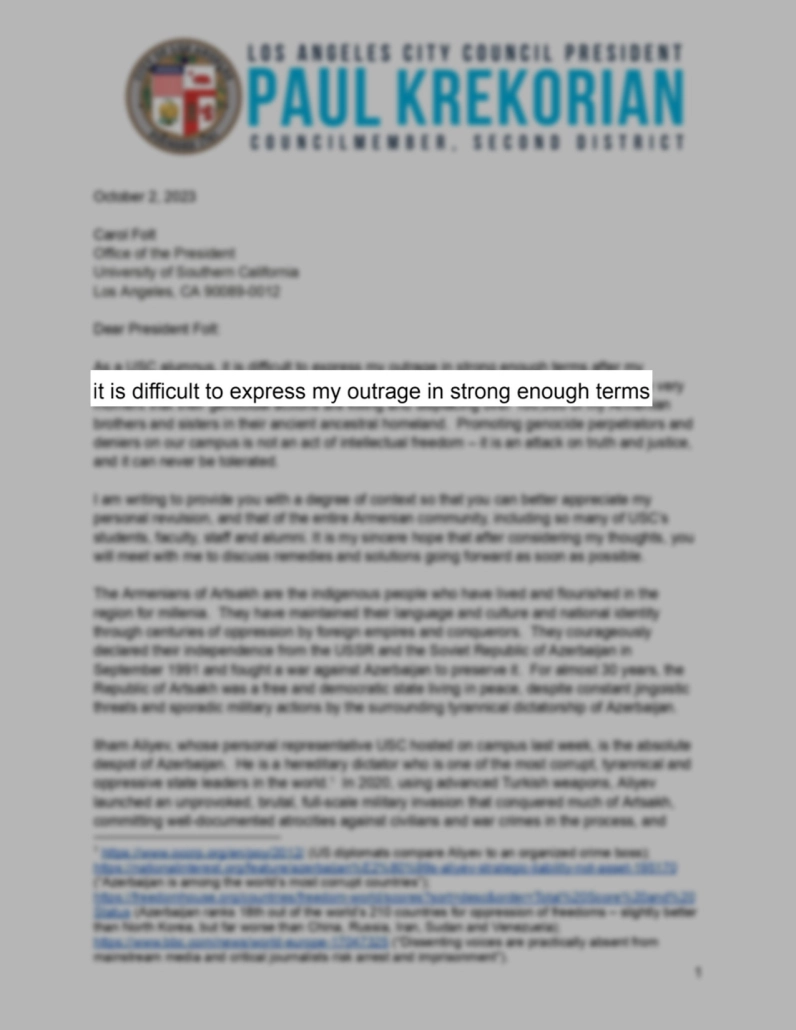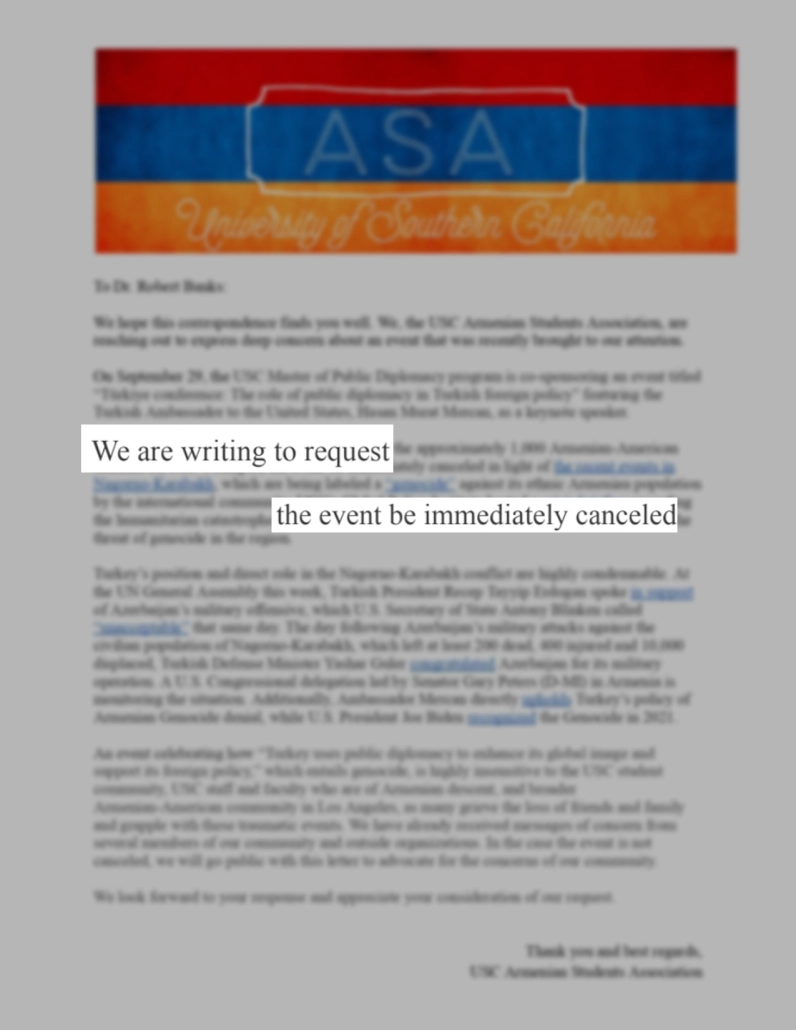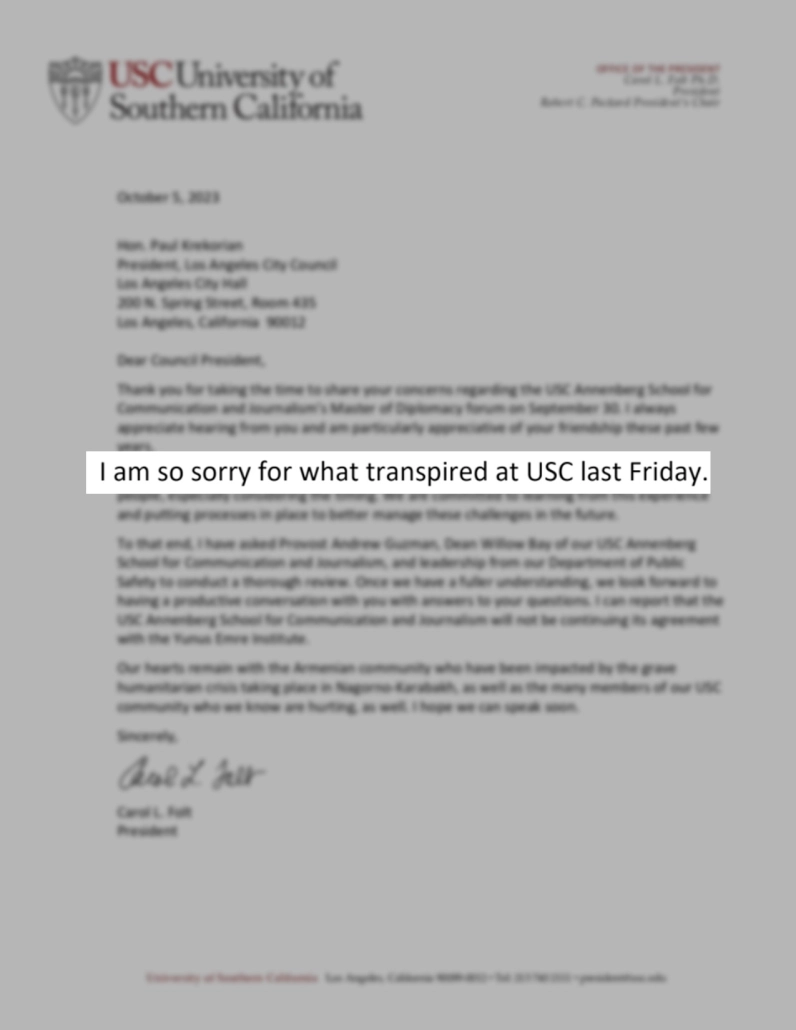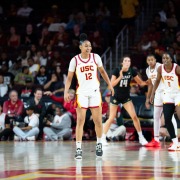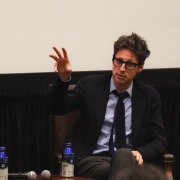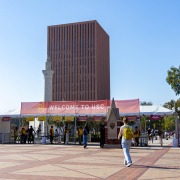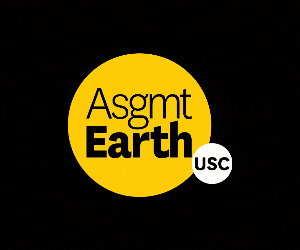Letters between USC and LA officials unveil aftermath of Türkiye Conference
President Folt announced USC has cut ties with the Yunus Emre Institute.
By JENNIFER NEHRER
Letters obtained by the Daily Trojan.
A Daily Trojan investigation of letters sent by President Carol Folt and Willow Bay, dean of the USC Annenberg School for Communication and Journalism, unearthed information previously unavailable to the public about what occurred before, during and after protesters condemned USC for hosting the Türkiye conference Sept. 29.
Turkish Ambassador Hasan Murat Mercan and Ramil Gurbanov, consul general of Azerbaijan in Los Angeles, appeared and gave speeches at the conference, which angered Armenians in L.A. amid what they called a resurgence of “genocide” of Armenians in Nagorno-Karabakh — also known as Artsakh — their ancestral land. Many had asked USC to cancel the conference in the days beforehand.
Daily headlines, sent straight to your inbox.
Subscribe to our newsletter to keep up with the latest at and around USC.
While USC went on with the conference and paid the price, a lack of communication between USC and students in the aftermath has left many unsure about why the University planned the conference, chose to continue with it and what relations look like moving forward.
Before
According to a letter Bay sent to L.A. City Council President Paul Krekorian Oct. 21, the Yunus Emre Institute — a foundation dedicated to promoting Turkey and its culture worldwide — contacted the University’s Master of Public Diplomacy program in late 2022 to set up a graduate students’ spring break trip to Turkey. According to the homepage of the institute’s website, the program was established after the Turkish government passed a law in May 2007.
Following this trip, attending students decided to host a forum with the institute at Annenberg to examine how other countries approach public diplomacy. The forum was scheduled for Sept. 29.
In the weeks prior to the forum, the institute suggested, then confirmed, that Mercan would speak.
On Sept. 19, Azerbaijan launched an “anti-terrorist” offensive in Nagorno-Karabakh, killing more than 200 people. Additionally, around 200 Armenians died whilst fleeing the region. An explosion at a busy fuel depot killed 170 people and at least another 64 died as they fled.
On Sept. 24, the Armenian Students’ Association sent an official letter to Robert Banks, the event’s moderator, asking USC to cancel the event out of respect for recent events and the University’s nearly 1,000 Armenian students.
“An event celebrating how ‘Turkey uses public diplomacy to enhance its global image and support its foreign policy,’ which entails genocide, is highly insensitive … as many grieve the loss of friends and family and grapple with these traumatic events,” ASA wrote.
(USC Armenian Students Association)
In the same letter, ASA explained how Turkish officials have publicly engaged in historical revisionism surrounding the Armenian genocide and current events. At a United Nations General Assembly meeting in September, Turkish President Recep Tayyip Erdogan publicly supported Azerbaijan’s military offensive in Nagorno-Karabakh. Turkish Defense Minister Yashar Guler congratulated Azerbaijan on the attack.
In response, Annenberg sent a statement to ASA the next day expressing that they were understanding of ASA’s concerns, but that free speech policies granted the program the right to hold the event.
“The freedom to express one’s views are at the foundation of what it means to be part of a research university,” the statement read. “We sometimes profoundly disagree with statements of faculty, invited speakers, or other students; such disagreement and critical analysis occur regularly at our university.”
On Sept. 26, ASA responded by posting a statement on Instagram that condemned USC for moving forward with the event. By holding the conference, the statement read, USC was platforming genocide denial during an ongoing ethnic cleansing.
The same day, the Undergraduate Student Government senate passed a resolution to ask the University to assist Armenian students and release a statement in support of the Armenian community.
In the early hours of Sept. 28, the world learned that Nagorno-Karabakh would officially dissolve itself by January 2024. Later that day, President Folt posted a statement on Instagram in support of Armenian students.
But on hosting the conference, Annenberg refused to back down.
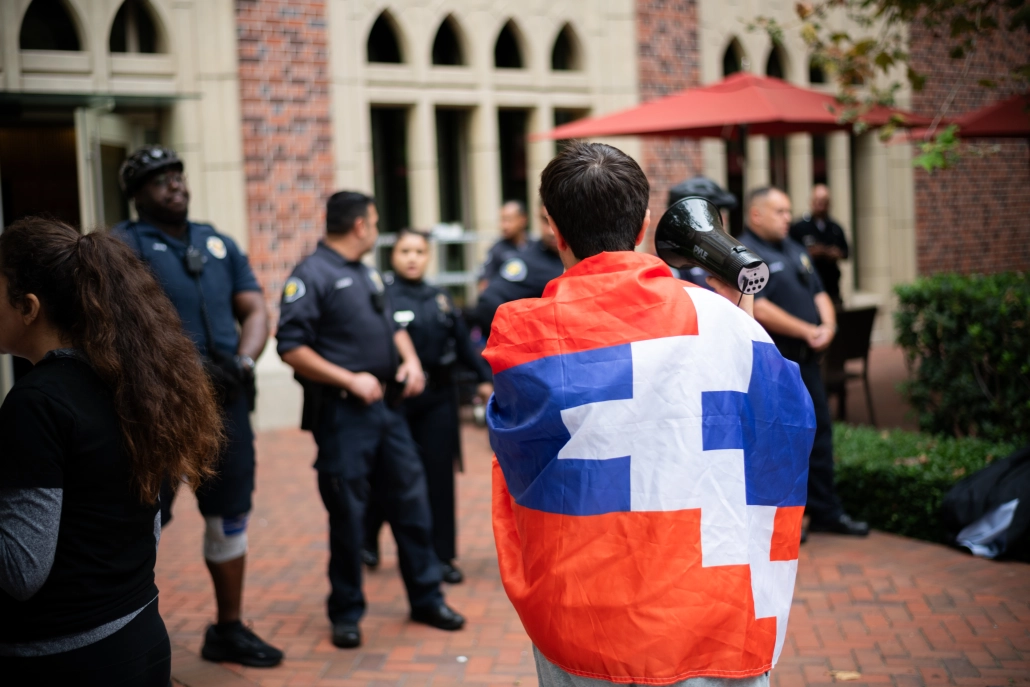
Annenberg School for Communication and Journalism Dean Willow Bay wrote Los Angeles City Council President Paul Krekorian that USC conducted a thorough internal investigation after receiving his letter. (Jordan Renville / Daily Trojan)
The day of the conference
Hours before the conference was supposed to take place, organizers learned Gurbanov would be present. Bay wrote the organizers advised that he not attend, but he did anyway.
Then, around 50 demonstrators protested for hours both inside and outside the event, interrupting speakers and chanting before Department of Public Safety officers escorted them out of Annenberg Hall.
Mane Berikyan, vice president of ASA, said Armenian students learned of Gurbanov’s presence in the middle of protesting — at the same time they were receiving devastating news about their homeland.
“I remember we were literally at the protests when we found out that the last group of Armenians from Nagorno-Karabakh had to flee, completing the ethnic cleansing,” she said.
During the protests, the USC Institute of Armenian Studies posted a message of solidarity with demonstrators on Instagram, calling out USC for hosting the conference.
“Today’s event at USC Annenberg, ‘Türkiye conference: The role of public diplomacy in Turkish foreign policy,’ is problematic due to Turkey’s decades of promoting fervent Armenian Genocide denial, Armenophobia, and more recently, Turkey’s political, military, and financial cooperation in Azerbaijan’s ethnic cleansing of the Armenians of Artsakh,” the statement read.
The demonstrators and their message went viral, appearing on several social media accounts and news outlets, and scores of angry commenters flooded USC’s social media.
After
On Sept. 30, ASA posted another statement on Instagram condemning USC for hosting the event and allowing DPS officers to use force against protesters.
The Turkish Foreign Ministry released a statement condemning the protests on Oct. 1, labeling them as an “Attack on Türkiye’s Public Diplomacy Conference Co-Hosted by Our Institute.”
On Oct. 2, Krekorian sent his letter to Folt, shaming her and USC for doubling down on holding the event.
“As a USC alumnus, it is difficult to express my outrage in strong enough terms after my university gave a platform to representatives of two genocidal nations last Friday — at the very moment that their genocidal actions are killing and displacing over 100,000 of my Armenian brothers and sisters,” he wrote.
Krekorian asked that USC conduct a review of the circumstances surrounding the event prior to a meeting with himself and other leaders within the Armenian American community. He is the first Armenian American to serve as L.A. City Council president, according to Zartonk Media, who first reported Oct. 6 that Krekorian had sent the letter.
(Office of Paul Krekorian)
An item of particular emphasis in Krekorian’s letter was USC’s relationship with the Yunus Emre Institute, as what he calls Erdogan’s “far-right political party” spoke of it and the University recently, calling it “our” institute in a post on X, formerly known as Twitter.
Folt sent Krekorian her response — also obtained by the Daily Trojan — three days later, apologizing for what had occurred and promising to conduct a review of the conference and surrounding events before meeting with him.
(Office of Carol Folt)
“I know how hard this was on so many people, especially considering the timing,” Folt wrote. “We are committed to learning from this experience and putting processes in place to better manage these challenges in the future.”
Folt announced in the letter that USC had officially cut ties with the Yunus Emre Institute.
We want this to set the precedent for Armenian voices to be perpetually heard on campus. It’s unfortunate that we have to be wronged to be heard.
Zare Arakelyan
Political chair of the USC Armenian Students’ Association
Bay sent her letter at the conclusion of said investigation. She described USC’s relationship with the institute and clarified that neither USC nor any staff involved with the event received gifts, though the institute did pay some event costs. Bay wrote that no foreign or domestic government had direct involvement in organizing the Türkiye conference.
On the management webpage for the institute, multiple Turkish ministers are listed as the president and members of the organization’s board of trustees. One assistant minister is a member of the institute itself.
(Office of Willow Bay)
Bay wrote that the University has implemented new protocols for event vetting and security, which include acknowledging global events before proceeding.
Both Folt and Bay ended their letters with appeals to Krekorian and the community, reiterating that they are open to further discussions in person, as Krekorian had requested.
“Our hearts remain with the Armenian community who have been impacted by the grave humanitarian crisis taking place in Nagorno-Karabakh,” Folt wrote. “I hope we can speak soon.”
Some students are not entirely relieved, especially since most do not know about the severed ties. Until the publication of this article, neither Folt’s nor Bay’s letters had been publicly released and USC had made no public statement regarding the Yunus Emre Institute.
Berikyan said she thinks while the letters are a step in the right direction, there is much more to do. The fact that the letters from Folt and Bay had not been shared with the community is indicative that USC has not yet opened crucial dialogues with Armenian students, and the hurt is still there, she said.
“When I have students coming to me and expressing these concerns, their frustration and the deep hurt they feel,” Berikyan said. “I still don’t feel that I have enough to reassure them that the administration cares about us.”
Berikyan said USC’s framing of the conference as “free speech” is hypocritical, as a respected academic institution that is home to the Shoah Foundation, which catalogues testimonials of genocide survivors.
USC should acknowledge the presence and impacts of Armenian students, Berikyan said, especially as they honor Artsakh Awareness Month in November and Armenian Heritage Month in April.
“At the end of the day, even after all of this happened, we still feel so invisible,” she said. “Armenian students just deserve better because we add so much value to campus. We have to continuously keep proving our value and our worth and our presence even though it’s there.”
Zare Arakelyan, political chair of ASA, said he appreciates that a dialogue has begun between officials at USC, but wishes that complaints did not have to go this far in the first place. He said he wants to focus on the future and how USC can make it up to Armenians. Arakelyan said he would like to see a formal statement from USC as well as assurance that they will not form relationships with organizations similar to the Yunus Emre Institute in the future.
Arakelyan also said he wants to see increased support for and recognition of the Armenian community at USC, perhaps by a formal expansion of ASA’s events and initiatives, before a potential similar mistake by USC occurs.
“We want this to set the precedent for Armenian voices to be perpetually heard on campus,” he said. “It’s unfortunate that we have to be wronged to be heard.”
Editor’s note: This article was updated at 3:07 p.m. Tuesday to reflect additional casualties that occurred as a result of the offensive in Nagorno-Karabakh.
DONATION PLUG – PLEASE DO NOT TOUCH
Thank you for reading the Daily Trojan.
We are the only independent newspaper here at USC, run at every level by students. That means we aren’t tied down by any other interests but those of readers like you: the students, faculty, staff and South Central residents that together make up the USC community.
Independence is a double-edged sword: We have a unique lens into the University’s actions and policies, and can hold powerful figures accountable when others cannot. But that also means our budget is severely limited. We’re already spread thin as we compensate the writers, photographers, artists, designers and editors whose incredible work you see in our daily paper; as we work to revamp and expand our digital presence, we now have additional staff making podcasts, videos, webpages, our first ever magazine and social media content, who are at risk of being unable to receive the support they deserve.
We are therefore indebted to readers like you, who, by supporting us, help keep our paper daily (we are the only remaining college paper on the West Coast that prints every single weekday), independent, free and widely accessible.
Please consider supporting us. Even $1 goes a long way in supporting our work; if you are able, you can also support us with monthly, or even annual, donations. Thank you.

